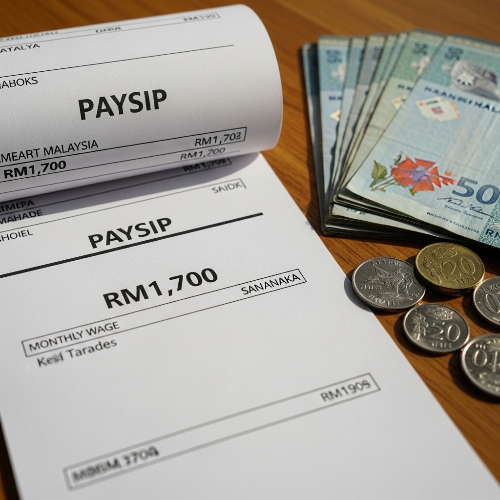Malaysia Raises Minimum Wage to RM1,700 in 2025 effective August 1, marking a significant policy shift aimed at improving worker welfare and ensuring fairer pay across industries. This adjustment, from the previous wage level, will apply to all employers nationwide, with strict penalties for non-compliance.
Details of the New Wage Policy
The new minimum wage of RM1,700 per month applies to full-time employees regardless of the sector or size of the business. Alongside the monthly increase, the policy also adjusts daily and hourly wage rates:
- Daily wage for a six-day workweek: RM65.38
- Hourly wage: RM8.72
These changes are designed to align with rising living costs, giving workers better financial security and purchasing power.
Penalties for Non-Compliance
The Ministry of Human Resources has reinforced enforcement measures to ensure compliance. Employers who fail to meet the new wage requirements face:
- Fines of up to RM10,000 per employee
- Potential imprisonment for repeat offenders
- Mandatory back-pay for underpaid wages
This strict enforcement is intended to discourage wage exploitation and maintain fair employment standards nationwide.
Why the Increase Was Implemented
The minimum wage increase is part of Malaysia’s broader economic and social strategy. Several key reasons underpin this decision:
- To address rising inflation and cost of living
- To improve living standards, especially for lower-income groups
- To ensure wage growth keeps pace with economic development
- To narrow income inequality between urban and rural workers
Impact on Workers
For workers, the increase means more disposable income, potentially allowing them to:
- Afford better housing and nutrition
- Cover education expenses for children
- Reduce reliance on debt for daily expenses
While the rise may not fully close the gap between wages and living costs in urban areas, it is a positive step towards greater financial security.
Impact on Businesses
The wage hike will affect businesses differently depending on their size and sector:
- Small and Medium Enterprises (SMEs): May face higher operating costs, potentially requiring price adjustments or productivity improvements
- Large Corporations: Generally more capable of absorbing the increase without major disruptions
- Labour-Intensive Industries: Such as manufacturing, retail, and hospitality may need to re-strategize staffing and efficiency
Some business groups have called for phased implementation, but the government has opted for a uniform start date to ensure fairness and clarity.
Economic Projections
Economists predict several potential outcomes from the wage increase:
- Short-term rise in operating costs for employers
- Boost in consumer spending due to higher disposable income
- Potential inflationary pressure in certain sectors
In the medium to long term, higher wages may lead to improved productivity, reduced employee turnover, and a stronger domestic market.
International Comparisons
Malaysia’s new minimum wage remains competitive regionally. For comparison:
- Singapore: No universal minimum wage, but sectoral wage floors exist
- Thailand: Around RM1,200 to RM1,500 equivalent per month
- Indonesia: Varies by province, generally RM800–RM1,200 equivalent per month
This positions Malaysia as offering one of the higher statutory minimum wages in Southeast Asia, potentially attracting and retaining talent while ensuring competitiveness.
Strategies for Employers
To adapt to the new wage policy, employers can consider:
- Investing in automation and process efficiency
- Upskilling employees to enhance productivity
- Reviewing pricing strategies to manage higher labour costs
- Leveraging government incentives for workforce development
Proactive adjustment can help mitigate the financial impact while maintaining workforce morale.
Challenges in Implementation
While the policy has clear benefits, several challenges remain:
- Ensuring compliance among smaller, informal businesses
- Balancing wage growth with business sustainability
- Monitoring inflationary effects to prevent erosion of wage benefits
The government has pledged to strengthen inspection and enforcement, particularly in sectors known for wage underpayment.
Public Reaction
Labour unions and worker advocacy groups have welcomed the increase, calling it a long-overdue step towards wage fairness. However, some employers have voiced concerns about the timeline and potential cost pressures, especially in rural areas where wage structures are traditionally lower.
Looking Ahead
As Malaysia moves forward with the new minimum wage, continuous monitoring will be essential. The government may adjust the rate in future years to align with inflation, economic performance, and productivity growth.
Conclusion
Malaysia Raises Minimum Wage to RM1,700 in 2025 is a landmark policy aimed at uplifting workers, reducing wage inequality, and ensuring fair compensation across sectors. While it poses challenges for certain businesses, the overall benefits for economic growth, workforce stability, and social well-being are expected to be significant.



